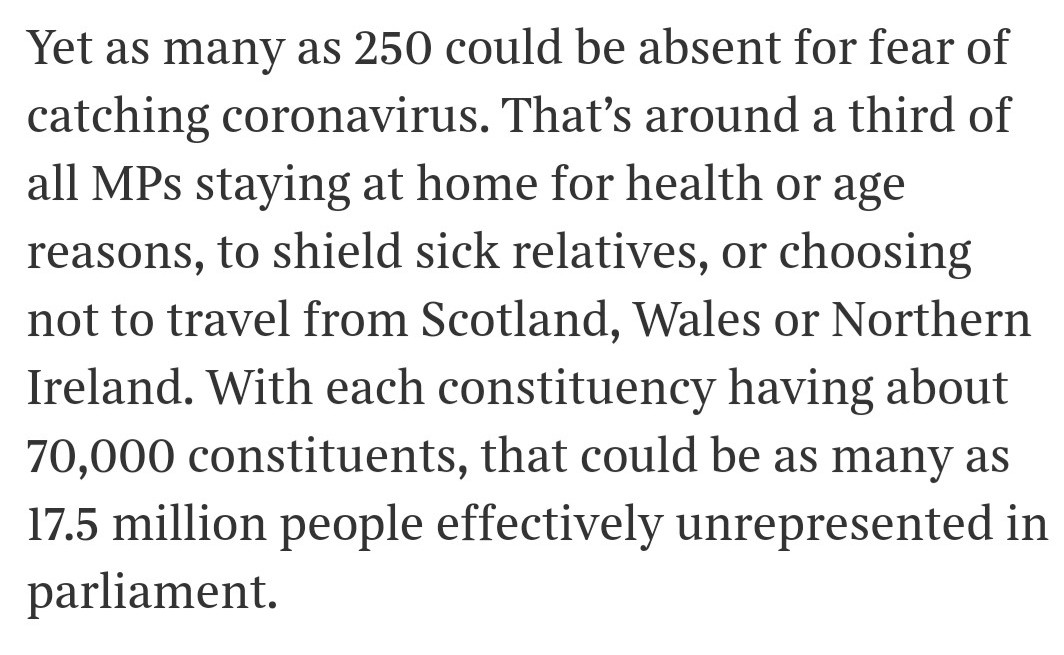Tomorrow MPs, or some of them anyway, will vote on whether to disenfranchise up to 17.5 million voters. THREAD
When the pandemic hit, Parliament introduced (on a temporary basis) remote voting for MPs. Excellent history here from @instituteforgov. https://www.instituteforgovernment.org.uk/publications/parliament-coronavirus-government-scrutiny">https://www.instituteforgovernment.org.uk/publicati...
The Government - here meaning whoever it is who makes policy for it, we don& #39;t know - will tomorrow ask MPs to vote on a motion to end remote voting.
We know the measure is opposed by a large number of MPs. https://twitter.com/DrHannahWhite/status/1267467489371455488?s=19">https://twitter.com/DrHannahW...
We know the measure is opposed by a large number of MPs. https://twitter.com/DrHannahWhite/status/1267467489371455488?s=19">https://twitter.com/DrHannahW...
We also know that the arrangements - theoretically up to 650 MPs spaced at 2m distances forming a line 1.3km long waiting to vote - will stop many MPs from participating in tomorrow& #39;s proceedings. Eg here is @margarethodge https://twitter.com/margarethodge/status/1267459620399984641?s=20">https://twitter.com/margareth...
Pausing there, a motion proposed by we know not whom, will, because of the way in which it is put before Parliament, effectively exclude many MPs from having a vote on it.
But it gets worse.
But it gets worse.
The consequences of the motion passing will be profound. Here& #39;s @timesredbox this morning: if it passes as many as 250 MPs will be unable to attend Parliament and vote; as many as 17.5 million voters will go without representation.
Outrageous right? Inconceivable that in what styles itself a modern democracy, as many as 17.5m voters could be denied representation at all; unimaginable that it could happen without even a proper vote in Parliament.
So the courts will step in, right?
Well, there is this thing called Parliamentary privilege: "whatever matter arises concerning either house of parliament, ought to be examined, discussed, and adjudged in that house to which it relates, and not elsewhere” (Blackstone, 1765).
Well, there is this thing called Parliamentary privilege: "whatever matter arises concerning either house of parliament, ought to be examined, discussed, and adjudged in that house to which it relates, and not elsewhere” (Blackstone, 1765).
And it means the courts can& #39;t - or shouldn& #39;t - get involved in rescuing the representation of those up to 17.5m voters.
There& #39;s a great discussion of Parliamentary Privilege here: https://www.google.com/url?sa=t&source=web&rct=j&url=https://publications.parliament.uk/pa/jt201314/jtselect/jtprivi/30/30.pdf&ved=2ahUKEwiogdTHseHpAhUBShUIHR-cC44QFjABegQIChAH&usg=AOvVaw0GrGzEh04OsplaYT-TB-MR">https://www.google.com/url...
There& #39;s a great discussion of Parliamentary Privilege here: https://www.google.com/url?sa=t&source=web&rct=j&url=https://publications.parliament.uk/pa/jt201314/jtselect/jtprivi/30/30.pdf&ved=2ahUKEwiogdTHseHpAhUBShUIHR-cC44QFjABegQIChAH&usg=AOvVaw0GrGzEh04OsplaYT-TB-MR">https://www.google.com/url...
The leading case on excluding MPs is called Bradlaugh v Gossett [1884] in which the Court allowed the Speaker in Parliament to refuse to apply the law obliging it to allow Mr Bradlaugh to take the oath making him an MP.
There are differences between Bradlaugh v Gossett and tomorrow. Mr Bradlaugh was misbehaving and it was necessary, at least that was the argument, to exclude him to protect the functioning of the House.
Not clear to me how that reasoning reads across to a step - the tabling of a motion - that cannot properly be voted on by MPs and which removes the franchise from as many as 17.5m voters. But I& #39;ve been asking around and I& #39;ve yet to find a barrister anxious to take the point on.
But we& #39;ll keep trying - that& #39;s what we do at @GoodLawProject, we want to be the last line of defence - so watch this space.
Oh, if you want to support our work you can do so here.
Sorry to be a stuck record but, to save me pointing it out to the clanking bot army below, I don& #39;t earn a penny from my work with @GoodLawProject. https://goodlawproject.org/membership/ ">https://goodlawproject.org/membershi...
Sorry to be a stuck record but, to save me pointing it out to the clanking bot army below, I don& #39;t earn a penny from my work with @GoodLawProject. https://goodlawproject.org/membership/ ">https://goodlawproject.org/membershi...

 Read on Twitter
Read on Twitter
![The leading case on excluding MPs is called Bradlaugh v Gossett [1884] in which the Court allowed the Speaker in Parliament to refuse to apply the law obliging it to allow Mr Bradlaugh to take the oath making him an MP. The leading case on excluding MPs is called Bradlaugh v Gossett [1884] in which the Court allowed the Speaker in Parliament to refuse to apply the law obliging it to allow Mr Bradlaugh to take the oath making him an MP.](https://pbs.twimg.com/media/EZc9FInWAAQ8CRH.jpg)


